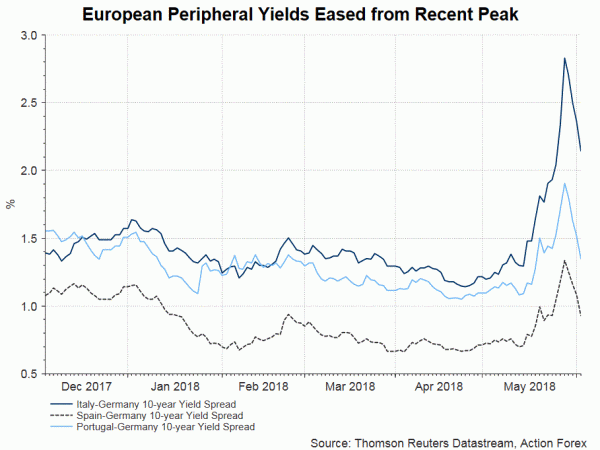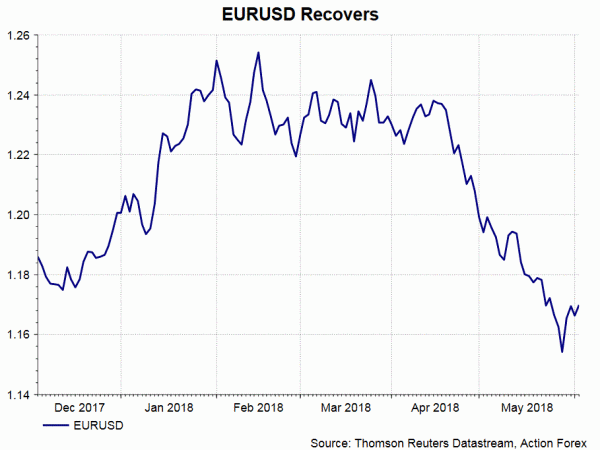Political deadlock in Italy was broken last week as President Mattarella approves the new cabinet after the euro-sceptic finance minister candidate, Paolo Savona, was replaced by Giovanni Tria. Tria supports that Italy should remain in the Eurozone, despite his call for reforms to the single currency. He is also supportive of the League’s heavily simplified tax rate, while worries about M5S’s plans to introduce a form of universal basic income. Savona will stay in the cabinet, taking up the role of European Affairs Minister. Other members in the cabinet are the same as the original plan with Giuseppe Conte being the prime minister. Financial markets calmed with bond yields of Italy, as well as those in peripheral European economies, easing and stock markets recovering. The single currency also recovered. Despite better sentiment, ongoing political uncertainty in peripheral Europe still warrants attention, in particular economic policy of the new Italian populist government and the upcoming snap election in Spain.

The parliamentary confidence vote would be held Tuesday and Wednesday. It would likely be supported by M5S and the League only. Other parties either reject or abstain. For instance, we expect Brother of Italy would not support but might not vote openly against it. Meanwhile, relations between the League and Forza Italia has turned sour as the former’s strong commitment to combat corruption included in the joint economic policy has displeased Forza Italia’s leader Berlusconi.
The situation reflects the difficulty in pushing the economic reform proposed by the populist duo, with its thin majority in the parliament. The new government would find the challenge of withstanding political and market pressures. The thin majority could disappear if just a few M5S/League members dissent on the more controversial policies. Moreover, President Matterela retains the veto power of government bills which are deemed “unconstitutional”. According to Article 81 of the Constitution, he could reject fiscal measures which could jeopardize the stability of public finance at risk. As we mentioned in the previous report, the latest version of the economy policy might result in a deficit slippage of 108-125B euro (6-7% GDP), in addition to the current 30B euro (1.7% GDP). Given the controversial nature of the economic plan, we doubt how many of the proposed policies could be approved. Implementation of the reform directly affects support or, hence the durability of, the new government. On the other hand, the government plans, if fully implemented, would result in major deterioration in the outlook of the country’s sovereign debt. Investors would price in more credit risk for Italy’s sovereign and higher spreads would follow.
Spain
In Spain, the political drama resumed. Socialist Pedro Sanchez has become the Prime Minister of the country as Mariano Rajoy was ousted after the vote of no confidence on June 1. Rajoy’s People’s Party was found guilty by the court last month of illegal party funding. The dust is far from settled as Sanchez is leading a minority government with Socialist’s 25% of seats in the Congress. The possibility of a snap election cannot be ruled out.

